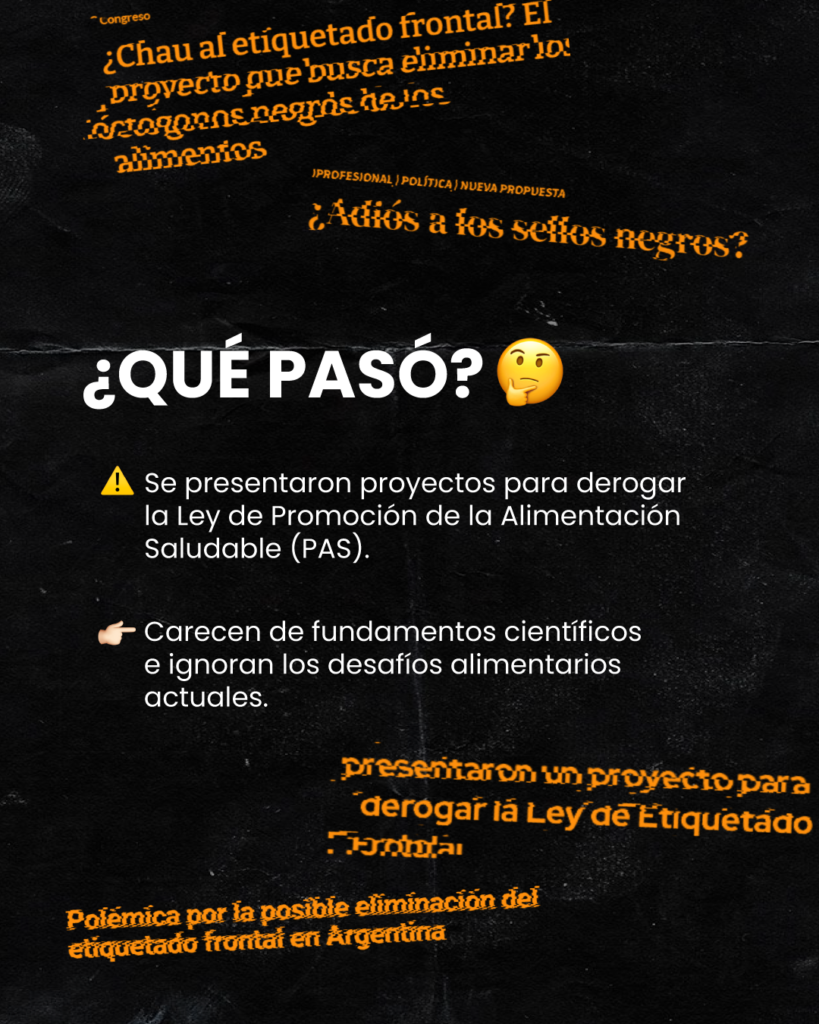Civil society, medical and academic organizations, among others, have united in defense of the law and against bills that seek to repeal it, as well as against rumors about the Executive Branch’s desire to modify it. More than 700 people, including doctors, cooks, journalists and nutritionists, among others, supported this demand by signing it.
Civil society organizations, medical associations, academic institutions, journalists, chefs, among other voices, have united in a declaration to defend the Healthy Eating Promotion Law (PAS Law) against attempts to weaken and/or revoke it. The initiative reinforces the importance of this policy within the set of policies needed to tackle the food situation in Argentina, marked by a high consumption of ultra-processed foods and insufficient consumption of healthy foods.
In the statement, the organizations argue that the PAS Law represents a step forward for the country’s public health, because it:
- Promotes the freedom of the population, bringing clear information on critical nutrients, which allows people to make informed decisions.
- Responds to the urgent problem of malnutrition. The consumption pattern is characterized by a high intake of ultra-processed products: among children and adolescents, more than 35% of daily calories come from these products and 29% in the adult population. In addition, national surveys show high levels of overweight and obesity, as well as persistent situations of malnutrition.
- Is the result of a plural and democratic debate, widely supported by Congress in all political sectors: in the Senate, it obtained 64 votes in favor and 3 against, while in the Chamber of Deputies it was approved by 200 votes in favor and 22 against, out of a total of 257 seats.
- The law is supported by recent research by UNICEF and FIC Argentina, which shows a significant reduction in the perceived healthiness of products with seals and in the intention to buy products such as yogurt, breakfast cereals and juices after the law was passed.
Although there is a need for further studies to verify the impact of the law as a whole in the medium and long term, similar results were reported in an opinion poll carried out by the Ministry of Health in 2023, in which 43% of the population reported that they take seals into account when buying. Among these people, 58% reported changing their intention to buy cookies and 57% drinks.
“We view with great concern these attacks on the law, which are based on arguments that are not supported by verifiable data, abound in unjustified assumptions and dismiss the problem of malnutrition in our country,” said Victoria Tiscornia, nutritionist and researcher at FIC Argentina. “The diversity oforganizations and agents who have signed the declaration reflects their support for the law and our firm willingness to continue improving the nutrition of the population, confronting these initiatives that seek to take a step backwards in terms of public health.”
The declaration calls on legislators and the Executive Branch to pay attention to the evidence, prioritize public health, and protect this instrument that is already showing positive results in the population’s diet.
